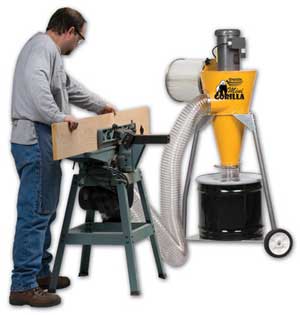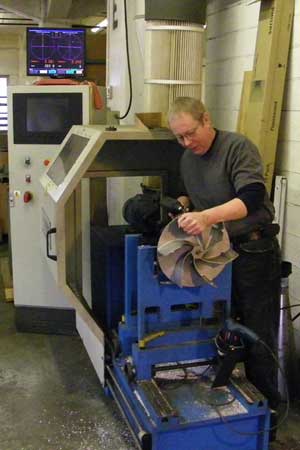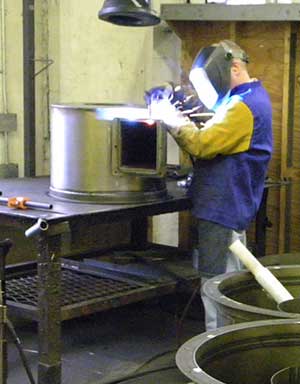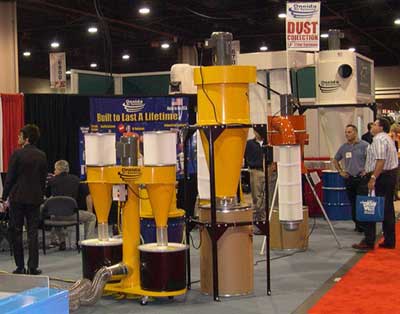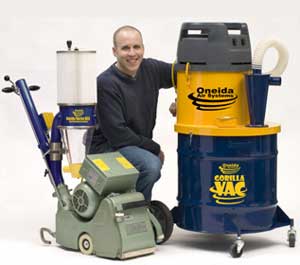
If you have a cyclonic dust and chip collector in your shop, Robert Witter helped to make that innovation a reality. He was among the first to scale this technology down from industrial proportions to systems that fit the small woodworking shop. But, according to Robert, it was necessity—not a stroke of genius—that was truly was the mother of invention for that development.
“Up until the early 90s, I worked as a mechanical engineer for a small engineering consulting agency in Upstate New York. We designed dust collection and heat transfer equipment for large woodworking companies and other industries. From time to time, we would get calls from the one- and two-man woodworking shops looking for better dust collection. I knew the technology was there to help them, but no one was catering to the smaller operators. The void was there; it was almost beating me over the head,” he recalls.
And so, quite literally out of his garage, Robert set his sights on servicing the niche. He began to draft plans on a case-by-case basis for whole-shop dust collection systems built around a cyclonic collector. Those early customers were small professional woodworking shops. The trouble was, clients would then have to take his plans to a variety of metal fabricators to build the necessary components. It was cumbersome and expensive.
Around the same time, a need for better dust collection was also growing in the home woodworking market. “Many hobby woodworkers were still pushing a broom around the shop or connecting their tools to shop vacuums and considering that to be their dust collection system. But those options sure don’t work when you buy a cabinet saw or a 20-in. planer. Big woodworking machinery creates a lot of dust and debris. As these sorts of machines were becoming more affordable, dust and chip collection became even more essential.”
The time seemed right to start a company that would provide both the design services and the products to make industrial quality dust collection a one-stop shop. So, in 1993, Robert and his wife Rebecca founded Oneida Air Systems. Shortly thereafter, they took out an ad in a woodworking magazine, and the response was more than enthusiastic. “Suddenly, I was getting customer calls at 3 a.m. We were offering the solution nobody else had at the time,” Witter says.
Initially, the Witters sourced ductwork and other components to local suppliers. Then, when quality control became an issue, they leased space in the former Porter-Cable/Rockwell building in Syracuse, New York, and opened a fabrication shop. It would allow them to build more Oneida products in-house.
From those modest beginnings 17 years ago, Oneida has since grown to a company of 50 employees that make 25 different base systems of dust collectors, plus some custom designs. These days, the company’s business is evenly spread between home-shop woodworkers, professional woodworking shops and other industrial clientele. Witter says 80 percent of the manufacturing process happens right in Oneida’s Syracuse factory, and all but about 10 percent of the parts are American-made. Materials and parts that are outsourced still come from local suppliers whenever possible, other vendors and from foundries in Minnesota, Pennsylvania and Ohio. The company uses American-made Baldor motors for powerplants. In fact, Witter has always been committed to American manufacturing: “You can build a better product close to where your customers are…I do that with skilled employees whose talents simply can’t be outsourced to other countries.”
Oneida also has an in-house design service, staffed by three full-time engineers, who can help customers create a suitable dust collection solution for their shop—no matter what size it might be.
“We ask customers to fill out a questionnaire, and most of them send in a footprint of their shop’s machine layout. Sometimes all it takes is a phone call with one of our engineers to figure out a ductwork plan or to help determine the right collector. Or, we can supply a CAD drawing tailored to your shop situation with a detailed list of all the parts you’ll need to build a complete system. We supply all of the necessary components,” Robert says.
Witter adds that most woodworkers already have a chip collector of some kind, but they want a cleaner air environment, too. And, they don’t want to take a physics class to figure it all out. “We can solve that problem and help customers avoid the usual pitfalls with real people on the phone.”
If you follow tool reviews, you might know that Oneida has won many magazine awards among their competition through the years, and several of these accolades are posted on the company’s website. Oneida is also branching out into new markets in Japan, Australia and the United Kingdom. I asked him how he would sum up the company’s continuing successes.
“We’re innovators who make products based on need. We’re a company that believes in LEAN manufacturing, and we make incremental improvements. It’s helped us weather the recent economic downturn very well, and I want it to continue to be our formula for the future.”
